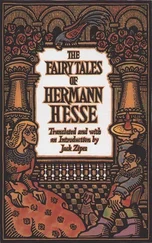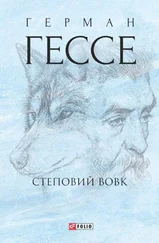He led the stealthy life of a vagabond, no longer actually fleeing from people, but rather avoiding them. And one day his roaming led him through a hilly region of lush grass which looked lovely and serene and seemed to welcome him, as though he ought to know it. In one place he recognized a meadow with softly swaying grasses in flower, in another a willow grove which reminded him of the serene and innocent days when he had not yet known love and jealousy, hatred and revenge. It was the pastureland where he had once tended the herd with his companions; that had been the most untroubled period of his youth. Now he looked back upon it across vast chasms of irrevocability. A sweet melancholy in his heart answered the voices that welcomed him here, the wind fluttering the silvery willows, the jolly song of the little brooks, the trilling of the birds, and the deep golden buzz of bumblebees. It all sounded and smelled of refuge, home; never before, used as he was to the roaming herdsman’s life, had he ever felt that a countryside was so homelike, so much part of him.
Accompanied and guided by these voices in his soul, with feelings like those of a soldier home from the wars, he wandered about this pleasant landscape, for the first time in many terrible months not a stranger, a fugitive, a candidate for death, but with an open heart, thinking of nothing, desiring nothing, surrendering utterly to the tranquil present, grateful and somewhat astonished at himself and at this new, unwonted, rapturous state of mind, this undemanding receptivity, this serenity without tensions, this new mode of taking delight in close observation. He felt drawn to the forest which lay beyond the green meadows. In among the trees, amid the dusk speckled by sunlight, the feeling of returning home intensified, and led him along paths which his feet seemed to find by themselves, until he passed through a fern thicket, a dense little forest of ferns in the midst of the greater woods, and reached a tiny hut. On the ground in front of the hut sat the motionless yogi whom he had once watched, and to whom he had brought milk and butter.
Dasa stopped, as if he had just awakened. Everything here was the same as it had been; here no time had passed, there had been no killing and suffering. Here, it seemed, time and life were hard as crystal, frozen in eternity. He stood looking at the old man, and there returned to his heart that admiration, love, and longing which he had felt upon his first sight of the yogi. He looked at the hut and thought that it probably needed some repairs before the onset of the next rainy season. Then he ventured a few cautious steps forward. He entered the hut and peered around. There was little there, almost nothing: a pallet of leaves, a gourd containing some water, and an empty pouch made of bast. He took the pouch and went into the woods searching for food. He returned with fruit and the sweet pith of certain trees. Then he went off with the gourd and filled it with fresh water.
Now he had done all that could be done here. There was so little a man needed to live. Dasa kneeled on the ground and sank into reveries. He was content with this silent repose and dreaming in the woods, content with himself, with the voice within him that had led him here where as a boy he had once sensed something like peace, happiness, and home.
And so he remained with the silent yogi. He renewed the pallet of leaves, found food for the two of them, repaired the old hut, and began building a second for himself a short distance away. The old man appeared to tolerate him, but Dasa could not quite make out whether he had actually taken notice of him. When he rose from his meditation, it was only in order to go to sleep in the hut, to eat a bite, or to walk a bit in the woods. Dasa lived with him like a servant in the presence of a nobleman, or rather the way a small pet, a tame bird or a mongoose, say, lives along with human beings, useful and scarcely noticed. Since he had been a fugitive for so long, unsure of himself, suffering pangs of conscience, seeking concealment and perpetually fearing pursuit, this life of repose, the effortless small labors and the presence of a man who did not seem to notice him, did him a great deal of good for a while. His sleep was not troubled by frightful dreams; for half and then whole days at a time he forgot what had happened. The future did not enter his mind, and if ever a longing or desire came to him, it was to remain where he was, to be accepted by the yogi and initiated into the secret of a hermit’s life, to become a yogi himself and partake of the proud indifference of yoga. He had begun to imitate the venerable ascetic’s posture, to sit motionless like him with crossed legs, like him to gaze into an unknown and superreal.world, and to cultivate apathy to everything around him. Whenever he made such attempts, he tired quickly; he found his limbs stiff and his back aching, was plagued by mosquitoes or bothered by all sorts of itches and twitches which compelled him to move, to scratch himself, and finally to stand up again. But several times he had felt something different, a sense of emptiness, lightness, and floating in air, such as sometimes comes in dreams in which we touch the ground only lightly now and then, gently pushing off from it to drift like a wisp of fluff. At such moments he had an inkling of what it must be like to float about that way all the time, body and soul divesting themselves of all weight and sharing the movements of a greater, purer, sunnier life, exalted and absorbed by a beyond, by timelessness and immutability. But these intimations had lasted only a moment. And every time he plummeted back into his ordinary self, disappointed, he thought that he must persuade the master to become his teacher, to initiate him into his exercises and secret arts and make a yogi of him also. But how was he to do that? It did not seem as if the old man would ever notice him, that there would ever be an exchange of words between them. Just as the yogi seemed beyond the day and hour, beyond the forest and hut, he also seemed beyond all words.
Nevertheless, one day he spoke a word. There came a time during which Dasa again dreamt night after night, often bewilderingly sweet and often bewilderingly dreadful dreams, either of his wife Pravati or the horrors of life as a fugitive. And by day he made no progress, could not long endure sitting and practicing, could not help thinking about women and love. He tramped about the forest a great deal. He blamed the weather for his condition; these were sultry days with sudden gusts of hot wind.
One more such bad day came. The mosquitoes hummed. Dasa had had another of his anguished dreams that left him with a sense of fear and oppression. He no longer remembered it, but upon waking it seemed to him that it had been a wretched, outrageous, and shameful relapse into earlier states and stages of his life. All day long he moved restively about the hut, or squatted gloomily. He dabbed at odd tasks, several times sat down for meditation exercises, but would each time be seized by a feverish unrest. His limbs twitched, he felt as if ants were crawling over his feet, had a burning sensation in the nape of his neck, and was unable to endure stillness for more than a few moments. Now and then he cast shy and ashamed glances at the old man, who sat in the perfect posture, eyes turned inward, face floating above his body in inviolable serenity like the head of a flower.
On this day, when the yogi rose and turned toward the hut, Dasa went up to him. He had waited long for this moment, and now blocked his way and with the courage of fear addressed him.
“Forgive me for disturbing your peace, reverend father,” he said. “I am seeking peace, tranquility; I would like to live as you do and become like you. As you see, I am still young, but I have already tasted much suffering. Destiny has played cruelly with me. I was born to be a prince and cast out to become a herdsman. I became a herdsman, grew up, strong and happy as a young bull, innocent in my heart. Then my eyes were opened to women, and when I beheld the most beautiful of them, I put my life at her service. Not to possess her would have killed me. I left my companions, the herdsmen. I sued for Pravati’s hand, was granted it, became a son-in-law, and labored hard for her. But Pravati was mine and loved me, or so I thought. Every evening I returned to her arms, lay upon her heart. Then, behold, the Rajah came to the neighborhood, the same on whose account I had been cast out as a child. He came and took Pravati from me; I was condemned to see her in his arms. That was the greatest agony I have ever experienced; it changed me and my whole life. I slew the Rajah. I killed and led the life of a criminal and fugitive. Every man’s hand was against me; my life was not safe for an hour until I stumbled upon this place. I am a foolish man, reverend father; I am a killer and perhaps may still be caught and drawn and quartered. I can no longer endure this terrible life; I want to be done with it.”
Читать дальше












